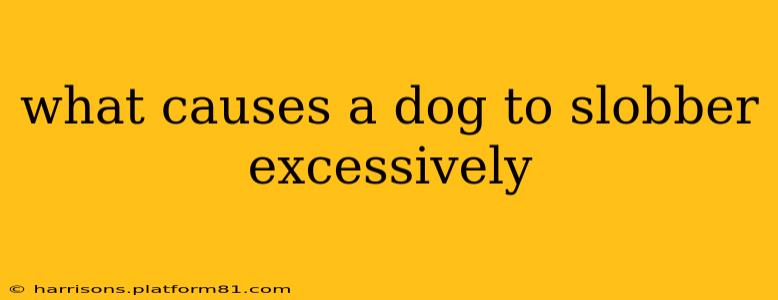Excessive drooling, or hypersalivation, in dogs is a common problem that can stem from a variety of causes. While a little drool is normal, especially in breeds predisposed to it, excessive drooling warrants attention. Understanding the underlying reasons can help dog owners address the issue and ensure their canine companion's well-being.
Why Does My Dog Drool So Much? Breed Predisposition
Many breeds are simply more prone to drooling than others. These breeds often have loose, pendulous lips or a facial structure that naturally leads to more saliva production. Examples include:
- Saint Bernards: Known for their massive size and gentle nature, they are notorious droolers.
- Mastiffs: These large, powerful breeds also tend to produce significant amounts of saliva.
- Bloodhounds: Their long, floppy ears often trap drool, exacerbating the appearance of excessive salivation.
- Great Danes: Another giant breed with a propensity for drooling.
- Chow Chows: Their distinctive facial features contribute to their drool-prone nature.
Is My Dog's Drooling a Sign of Illness? Medical Causes
While breed predisposition is a significant factor, excessive drooling can also signal an underlying medical condition. These can range from minor irritations to more serious health problems.
Dental Issues:
Dental disease, including gingivitis, periodontitis, and abscesses, can cause significant discomfort and inflammation in the mouth, leading to increased salivation. Regular dental check-ups are crucial for maintaining oral health.
Nausea and Gastrointestinal Upsets:
Dogs experiencing nausea, often preceding vomiting, may drool excessively. This is the body's way of attempting to clear irritating substances from the mouth. Gastrointestinal issues such as pancreatitis can also cause increased salivation.
Foreign Bodies:
Something lodged in the dog's mouth or throat, such as a bone, toy piece, or plant material, can trigger excessive drooling as the dog tries to dislodge the object.
Kidney Disease:
In advanced stages, kidney disease can cause increased saliva production. Other symptoms, such as increased thirst and urination, often accompany this.
Nervous System Disorders:
Certain neurological conditions can affect the salivary glands, leading to increased drooling. Seizures, for instance, can cause hypersalivation.
Poisoning:
Exposure to toxins can irritate the mouth and gastrointestinal tract, stimulating excessive saliva production. This is a serious condition requiring immediate veterinary attention.
Mouth Tumors:
Oral tumors can cause pain, inflammation, and increased drooling.
What About Medications?
Some medications can have hypersalivation as a side effect. If your dog recently started a new medication and is drooling excessively, consult your veterinarian.
When Should I See a Veterinarian?
While some drooling is normal, you should consult a veterinarian if:
- The drooling is sudden or excessive. A significant increase in drooling compared to your dog's usual behavior is a cause for concern.
- The drooling is accompanied by other symptoms, such as vomiting, lethargy, loss of appetite, or difficulty breathing.
- Your dog appears to be in pain or discomfort.
- The drooling persists despite home remedies or doesn't improve.
How Can I Reduce My Dog's Drooling?
For breeds prone to drooling, there's often little you can do to completely eliminate it. However, you can manage it:
- Regular dental care: Brushing your dog's teeth regularly and providing dental chews can help minimize dental issues contributing to drooling.
- Wipe down your dog's face: Regularly wiping your dog's face can help remove excess saliva and prevent skin irritation.
- Provide fresh water: Ensuring access to fresh water can help keep your dog hydrated, which may indirectly reduce drooling in some cases.
Ultimately, determining the cause of excessive drooling requires a veterinary examination. They can perform a thorough assessment, run diagnostic tests if needed, and provide the appropriate treatment or management plan. Don't hesitate to seek professional help if you're concerned about your dog's drooling.
